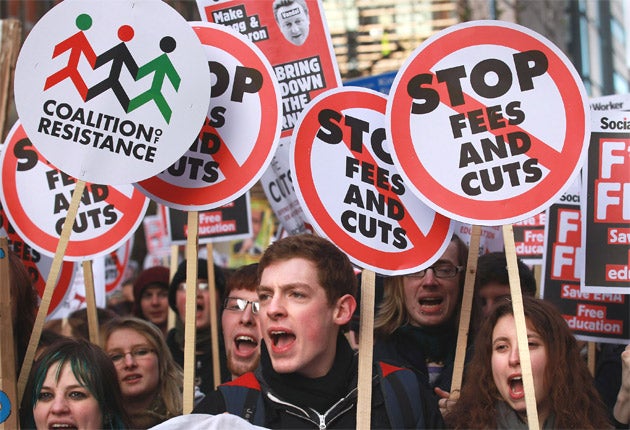Universities to escape challenge over high fees

Your support helps us to tell the story
From reproductive rights to climate change to Big Tech, The Independent is on the ground when the story is developing. Whether it's investigating the financials of Elon Musk's pro-Trump PAC or producing our latest documentary, 'The A Word', which shines a light on the American women fighting for reproductive rights, we know how important it is to parse out the facts from the messaging.
At such a critical moment in US history, we need reporters on the ground. Your donation allows us to keep sending journalists to speak to both sides of the story.
The Independent is trusted by Americans across the entire political spectrum. And unlike many other quality news outlets, we choose not to lock Americans out of our reporting and analysis with paywalls. We believe quality journalism should be available to everyone, paid for by those who can afford it.
Your support makes all the difference.Not a single university will have its fees renegotiated by the government body charged with approving them, it emerged yesterday.
The Office for Fair Access (Offa) does not plan to stop any universities charging the fees they have applied for, The Independent understands, leaving the Government with a £1bn deficit.
It has also emerged that Offa has never punished a university for failing to meet its access targets since it was established in 2004. For the year 2008-09, the most recent figures available, 26 institutions did not meet the aims of their access agreements. In theory Offa could have punished them with fines of up to £500,000 but not one was handed out.
Just last month the Deputy Prime Minister Nick Clegg said that the decision to charge maximum wasn't up to universities as they "can't charge £9,000 unless they're given permission to do so". He also promised "real sanctions" for those institutions that fail to meet their targets.
Under the rules, Offa can ban universities from charging more than £6,000 if they do not outline a plan to increase the number of poorer students but they are not expected to do so with any university in the country.
David Barrett, assistant director of Offa, said that while it was theoretically possible that universities would have their access agreements rejected, he thought it very unlikely that any fees would be lowered.
"We are not a fee pricing regulator; that is not our role. If an institution wishes to charge a fee it has to have an accurate access agreement in place and we do have greater expectations the higher the fee. But we wouldn't say to an institution we would only allow a fee of 'X' or 'Y'."
This will leave the Government with a £1bn gap in funding as its financing model is built upon average fees of £7,500. Under the proposals the initial fees are paid by the Government in the form of a loan with the aim of recovering its money once students graduate. If the average fees are closer to £9,000, the Government will have to allocate up to £1bn extra to pay for it.
Adrian Bailey, chair of the business select committee, said that the failure of Offa to renegotiate prices was "surprising" and would leave the Government with a funding crisis.
"The fact remains that the Government modelled its financial support on the average of £7,500 and that does not look as if it will be the case. Either the Government has got to lean on Offa [to reduce fees] or it has got to look at its financial modelling again."
Gareth Thomas, Labour's shadow higher education spokesman, said: "Ministers were wrong that the Office for Fair Access could control fees and they're wrong that their plans will lead to more people from disadvantaged backgrounds going to university."
Mr Barrett denied that the body was seen as soft, and said the focus was on ensuring long-term goals were met.
"We wouldn't fine a university for not making their targets. We would have a conversation with that university about how they use their resources more wisely. It would be a case of trying to improve the next agreement rather than issuing a fine."
But Mr Bailey said the lack of fines was worrying. "On the surface of it, it would indicate that Offa was fairly toothless and to suddenly be transformed into a tigerish body it will need to be seems to be a leap of faith by the Government."
But a Government spokeswoman said the guidance given to Offa was now far more stringent than it had been under Labour and she expected that the body would take a far tougher line than it had done: "Our direction to Offa means that universities will have to do far more on retention, outreach and helping disadvantaged students."
Under the terms of its remit Offa is charged with making sure that students on lower incomes are not deterred from accessing higher education. Universities submit access agreements and these are negotiated with the body, often over several months, until they are deemed satisfactory. Under the current rules Offa cannot, however, prevent a university charging the top fees if it has submitted satisfactory access agreements.
Subscribe to Independent Premium to bookmark this article
Want to bookmark your favourite articles and stories to read or reference later? Start your Independent Premium subscription today.
Join our commenting forum
Join thought-provoking conversations, follow other Independent readers and see their replies
Comments